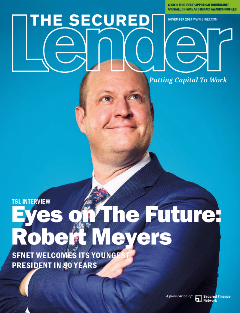TSL Feature Articles
-
 The “New Normal” Roundtable
What challenges have industry executives been up against since the pandemic hit and what kind of future do they envision for the industry? TSL spoke with several SFNet members: Jason Hoefler, managing director/asset-based lending, BMO Harris Bank; Candice Hubert, senior vice president of business development, Republic Business Credit; Mark Polinsky, executive vice president and co-founder of Gateway Trade Funding; Georgia Quenby, partner, Morgan Lewis & Bockius; Stuart Rosenthal of Prestige Capital; and Dan Tortoriello, executive vice president/chief operating officer of North Mill Capital.
The “New Normal” Roundtable
What challenges have industry executives been up against since the pandemic hit and what kind of future do they envision for the industry? TSL spoke with several SFNet members: Jason Hoefler, managing director/asset-based lending, BMO Harris Bank; Candice Hubert, senior vice president of business development, Republic Business Credit; Mark Polinsky, executive vice president and co-founder of Gateway Trade Funding; Georgia Quenby, partner, Morgan Lewis & Bockius; Stuart Rosenthal of Prestige Capital; and Dan Tortoriello, executive vice president/chief operating officer of North Mill Capital. -
 COVID-19 is popularizing asset-based lending. Here’s why.
Edward Gately of MUFG discusses the reasons for ABLs rise in popularity as a result of the pandemic.
COVID-19 is popularizing asset-based lending. Here’s why.
Edward Gately of MUFG discusses the reasons for ABLs rise in popularity as a result of the pandemic. -
 (Almost) Painless Networking
(Almost) Painless Networking
Although experts generally agree that networking is important to career success, a surprisingly large number of professionals dread the process to the point that the mere mention of the word makes them anxious and irritated. Lynn Tanner of Winston and Strawn provides a detailed “cheat sheet” for taking the pain out of networking.
-
Reaching the Top: C-Suite Women in Secured Finance Roundtable
What does it take to break the proverbial glass ceiling in secured finance? What does the journey to the “top” look like for women in financial services? We interviewed four C-Suite women and here is what they had to say. The women we spoke with are Meredith Carter, president and CEO, Context Business Lending; Miin Chen, COO, Siena Lending Group; Deborah Monosson, president & CEO, Boston Financial & Equity Corporation; and Jennifer Yount, partner, Paul Hastings LLP.
-
 Women Leaders Talk About Advancing in the Ranks
Women Leaders Talk About Advancing in the Ranks
Secured Finance executives and an executive recruiter discuss how the industry can attract and retain more women.
-
 Interview with Jennifer Palmer
Interview with Jennifer Palmer
In January, Gerber Finance announced the completion of its CEO succession strategy, naming longtime president Jennifer Palmer as CEO with Founder Gerald Joseph transitioning to his new role as strategic advisor and chairman of the board.
-
 Innovation is Key to Survival for Factors
The CEO of TBS Factoring discusses the importance of innovation in factoring and how she applies the lessons of the past to her current role.
Innovation is Key to Survival for Factors
The CEO of TBS Factoring discusses the importance of innovation in factoring and how she applies the lessons of the past to her current role. -
 Interview with Ryan Jaskiewicz of 12five Capital, LLC
Interview with Ryan Jaskiewicz of 12five Capital, LLC
Ryan Jaskiewicz is CEO of 12five Capital, LLC. He started 12five Capital in early 2006 at the age of 23. Jaskiewicz attended University of Illinois at Chicago where he received a bachelor of arts in political science.
-
 CARES Act Paycheck Protection Loan Program: From the Secured Lender Perspective
CARES Act Paycheck Protection Loan Program: From the Secured Lender Perspective
Editor's Note: SFNet’s Advocacy Committee is prioritizing initiatives to support our bank, non-bank and service provider constituents. A key component of this is analyzing the Coronavirus Aid, Relief, and Economic Security (CARES) Act, which was enacted on March 27, for specific opportunities to address the needs of our members and borrowers across asset classes and industries, as the focus now turns to implementation.
-
 Success By Lenders Working Together
Success By Lenders Working Together
Forrest Gump said, “Life is like a box of chocolates; you never know what you are going to get.” Partnering with other lenders can be similar. You don’t know what you are going to get if you jump into partnerships without doing your due diligence and establishing alliances with the best partners.
-
Interagency Guidance for Financial Institutions on Coronavirus Disease-Related Loan Modifications
On Sunday night, March 22, 2020, the federal banking agencies (OCC, FDIC, NCUA, Federal Reserve), the Consumer Financial Protection Bureau and the State Conference of Bank Supervisors issued an Interagency Statement on Loan Modifications and Reporting for Financial Institutions Working with Customers Affected by the Coronavirus.
-
 Top 5 Invoice Finance Frauds
Top 5 Invoice Finance Frauds
Aaron Hughes looks at some of the ways directors might misuse their invoice finance facilities and how lenders can stem any potential losses.
-
 Exploring Forbearance Issues in the Context of COVID-19
Exploring Forbearance Issues in the Context of COVID-19
The lightning-fast spread of COVID-19 around the world has quickly transformed our commercial and financial outlook, ending one of the longest economic expansions in U.S. history and throwing future prosperity into doubt. As conditions deteriorate from here, the likelihood that lenders will need to consider a forbearance is high, and as such, now is a good time to identify at-risk credit facilities and perform any necessary due diligence.
-
 What a Lender Needs to Know: Key Loan Document Terms in a Time of Crisis
What a Lender Needs to Know: Key Loan Document Terms in a Time of Crisis
As circumstances are moving rapidly, companies and their lenders are dealing with unprecedented times. While companies try to determine the full impact of the current economic tailspin on their businesses, lenders are looking to understand their risks and how they can respond to them.
The credit agreement sets out the rules of the road for the relationship between a company and its lenders. In the list of credit agreement provisions set out below we attempt to provide a map for the secured lender for navigating those rules, anticipating where there may be bumps or wrong turns and providing some guidance for where a lender may go in the credit agreement to determine its path when confronted with a borrower in distress.
-
 What a Lender Needs to Know: Key Loan Document Terms in a Time of Crisis
What a Lender Needs to Know: Key Loan Document Terms in a Time of Crisis
As circumstances are moving rapidly, companies and their lenders are dealing with unprecedented times. While companies try to determine the full impact of the current economic tailspin on their businesses, lenders are looking to understand their risks and how they can respond to them.
The credit agreement sets out the rules of the road for the relationship between a company and its lenders. In the list of credit agreement provisions set out below we attempt to provide a map for the secured lender for navigating those rules, anticipating where there may be bumps or wrong turns and providing some guidance for where a lender may go in the credit agreement to determine its path when confronted with a borrower in distress.
-
 Will the Coronavirus impact your borrowers?
Will the Coronavirus impact your borrowers?
Do not underestimate the impact of the Coronavirus on a company’s Q1 and Q2 2020 financial results. The supply chain issues are unknown, the potential economic slowdown is unknown, and the length of time the impact will be felt is unknown.
This will certainly be a standard excuse for performance weakness that will be heard over the next year. Be prepared!
As a lender, which borrowers do you consider for impact, and what do you do to stay ahead of the problem?
-
 Lender Alert: Commercial Finance Disclosure Legislation In New York State Merits Watching
Lender Alert: Commercial Finance Disclosure Legislation In New York State Merits Watching
If passed, proposed New York State Senate Bill S5470 (“the Bill”) would impose a disclosure requirement upon certain New York commercial lenders. This proposal follows a trend exemplified most notably in California, which amended the California Financing Law to require licensed commercial lenders and brokers to issue new disclosures to commercial borrowers in that state, including loans made via an internet platform.
The required disclosures of the Bill approximate those in the loan estimate form issued to home buyers by residential mortgage lenders under the federal Truth in Lending Act. The Bill has several exceptions, leaving much of the commercial lending community unaffected and placing substantial regulatory burdens on a narrow remaining segment
-
 Vernon Francois: Prestige Capital Supports Entrepreneur’s Partnership with Sally Beauty
Vernon Francois: Prestige Capital Supports Entrepreneur’s Partnership with Sally Beauty
Vernon Francois grew up in a Rastafarian household where the weekly tradition was having his hair braided every Sunday. The experience was so painful that he decided to learn how to braid hair himself, using carpets and window shade edges as practice.
All that practice paid off. When he was just Vernon Francois grew up in a Rastafarian household where the weekly tradition was having his hair braided every Sunday. The experience was so painful that he decided to learn how to braid hair himself, using carpets and window shade edges as practice.
-
 Your Client’s Cybersecurity Threat Is Your Threat Too
The specter of cybercrime haunts every industry, but none more so than financial services. If there is considerable money involved or sensitive client data to steal, then there is certainly some cybercriminal looking for a financial firm to target. As secured lenders step up their efforts to secure their own systems and data, there is a growing understanding of the complexity of that task. Asset-based lenders and factors are increasingly aware that their cybersecurity procedures must be ongoing and dynamic to thwart a network intrusion and to quickly shut down and mitigate a hack if it does happen.
Your Client’s Cybersecurity Threat Is Your Threat Too
The specter of cybercrime haunts every industry, but none more so than financial services. If there is considerable money involved or sensitive client data to steal, then there is certainly some cybercriminal looking for a financial firm to target. As secured lenders step up their efforts to secure their own systems and data, there is a growing understanding of the complexity of that task. Asset-based lenders and factors are increasingly aware that their cybersecurity procedures must be ongoing and dynamic to thwart a network intrusion and to quickly shut down and mitigate a hack if it does happen. -
 Isn’t That What it Says? --Potential Perils of Incorporation by Reference in Finance Transactions
Isn’t That What it Says? --Potential Perils of Incorporation by Reference in Finance Transactions
The author discusses the potential perils of improper use of “incorporation by reference” in commercial lending transactions, as well as potential strategies for reducing potential incorporation by reference hazards.
Click on the link below to meet some of the “difference makers” in the secured finance community. This issue of The Secured Lender celebrates those who are having a profound impact on both their communities and their organizations.
Previous TSL Articles
-
 Wolters Kluwer’s Regulatory & Risk Management Indicator Survey Outlook
Feb 16, 2023
Wolters Kluwer’s Regulatory & Risk Management Indicator Survey Outlook
Feb 16, 2023TSL Express’ senior editor sat down with Tim Burniston, senior advisor, Regulatory Strategy for Wolters Kluwer Compliance Solutions to discuss the results of Wolters Kluwer’s Regulatory & Risk Management Indicator Survey. Burniston advises the Wolters Kluwer Governance, Risk, and Compliance executive leadership team and clients on emerging issues, legislative and regulatory developments, and regulatory strategy.
Now in its tenth year, the Indicator “takes the pulse” of the U.S. banking industry and is based on 10 different factors: compliance, regulatory environmental and risk management factors. The Regulatory & Risk Management Indicator Survey was conducted between July 27-September 9, 2022, and received 328 responses. Survey respondents are primarily from smaller banks, savings and loan institutions and credit unions. Keeping pace with the volume, scope and breadth of regulatory changes topped the list of key concerns facing U.S. banks, credit unions, and other lenders. To learn more about the survey, click here.
-
 Review and Forecast with Capital One's Dave Kucera
Feb 1, 2023
Review and Forecast with Capital One's Dave Kucera
Feb 1, 2023As a leading authority and 25-year veteran of the investment and commercial banking sectors, Dave Kucera, head of Capital One’s Financial Institutions Group, sat with TSL Express’ senior editor to discuss best practices for managing market cycles. Including the commercial banking trends to watch out for in 2023 and key steps financial institutions can take to better navigate the current economic landscape.
-
 SFNet’s Asset-Based Capital Conference: Attendees Gear Up for “The Great Reboot”
Jan 9, 2023
SFNet’s Asset-Based Capital Conference: Attendees Gear Up for “The Great Reboot”
Jan 9, 2023Conference Aims to Set New Strategies for the New World
Now three years since the onset of the global pandemic, the asset-based capital market, like so many others, finds itself at a new beginning. While the economy and environment continue to shift, the asset-based capital community has taken uncertainty into account for its business plans as it marches into a new year. SFNet’s ABCC theme, “The Great Reboot,” is about setting new strategies for a new world.
“We’ve been able to bring together some of the best minds in the space to help us put these changes in context and offer practical implications for our business plans going forward,” Rich Gumbrecht, SFNet CEO, said. I don’t know if we’ve ever had a more august set of speakers. You’ll want to take good notes.” -
SFNet Reports Confidence in Asset-Based Lending Market
Dec 19, 2022
The third quarter saw continued confidence in the asset-based lending market, according to data released by the Secured Finance Network, and that was welcome news as the country wrestles with inflation, rising interest rates and a slowed economy.
SFNet surveyed bank and non-bank asset-based lenders (ABLs) on key indicators for its quarterly Asset-Based Lending Index and SFNet Confidence Index.
-
SFNet Report on Confidence in Asset-Based Lending Market: Survey Shows Industry is Well Positioned to Weather a Recession
The third quarter saw continued confidence in the asset-based lending market, according to data released by the Secured Finance Network, and that was welcome news as the country wrestles with inflation, rising interest rates and a slowed economy.
SFNet surveyed bank and non-bank asset-based lenders (ABLs) on key indicators for its quarterly Asset-Based Lending Index and SFNet Confidence Index.
“Despite the challenges, the asset-based lending industry remains on solid footing,” said SFNet CEO Richard D. Gumbrecht. “Portfolio performance is strong by historical standards, commitments are up, and lenders anticipate strong demand. Overall, the industry is decently-positioned to weather worsening business conditions and a potential recession.”
-
 Convention Panel on Cannabis Points to Growing Market with Many Red Flags
Dec 14, 2022Cannabis remains a controlled substance at the federal level, but a number of states have legalized it under state law. As a result, marijuana-related business (MRB) lending is ripe for growth. However, banks and non-bank lenders are entering this sector with caution. The presenters at SFNet’s 78th Annual Convention in November provided Canadian and U.S. perspectives on this dynamic market.
Convention Panel on Cannabis Points to Growing Market with Many Red Flags
Dec 14, 2022Cannabis remains a controlled substance at the federal level, but a number of states have legalized it under state law. As a result, marijuana-related business (MRB) lending is ripe for growth. However, banks and non-bank lenders are entering this sector with caution. The presenters at SFNet’s 78th Annual Convention in November provided Canadian and U.S. perspectives on this dynamic market. -
 SFNet Annual Convention Highlights - Master Disruption and Charge Ahead in 2023 (With Some Caution)
SFNet Annual Convention Highlights - Master Disruption and Charge Ahead in 2023 (With Some Caution)
SFNet’s Annual Convention was held in Austin from November 9-11. This article provides an overview of the key topics addressed.
Listening to Convention keynoter Peter Zeihan’s geopolitical perspectives is a reminder of the many global and economic disruptors possible and all that one can’t control. However, in keeping with the event’s theme of "Mastering Disruption, Putting Capital to Work in the New Global Environment,” the breakout sessions triggered healthy discussion about what a new global environment for lending could look like, how data could be more strategically used to protect cross-border interests or prevent fraud, and how new supply chain models are forming. The factoring and asset-based lending sessions presented ways to master their markets while facing recessionary headwinds.
Besides the many opportunities to network with peers and clients, attendees in Austin, TX, could absorb others’ views on economic conditions affecting the industry and dive into niche topics of strategic importance.
-
 Disbanding the Change-Prevention Committee
Nov 16, 2022
Disbanding the Change-Prevention Committee
Nov 16, 2022The way an organization handles change is critical to its success, particularly during periods of uncertainty. In the year 500 B.C., the Greek philosopher Heraclitus observed that life was in flux, with everything constantly on the verge of becoming something else. He noted that resisting this natural flow was a hindrance to progress and growth in all aspects of life.
Resistance, however, has proven to be a very normal human response to change over the centuries and in organizations today, often manifests itself in the form of the formidable Change-Prevention Committee.
-
 Funding in the Food Circle – the Winds of Change
Nov 8, 2022
Funding in the Food Circle – the Winds of Change
Nov 8, 2022Food. It’s at the heart of all our lives. We love it – we think about it – we plan it – we talk about it.
Never before has there been so much focus on food: where it comes from, how much it costs and how to keep getting it. Just about all of us who have recently bought groceries think: “Wow – that’s a lot more expensive than it was last year.” When I said that recently to a good friend, she responded that this must be due to inflation and Ukraine. I thought: that is too simple an answer.
-
 An Interview with Matthew Bjonerud, Founder and CEO, Cerebro Capital
In this installment of our series of executive interviews, Charlie Perer sits with Matthew Bjonerud of Cerebro Capital to hear his perspective on the state of the debt capital markets, building a new distribution channel, the future of lending and technology, among other things.
An Interview with Matthew Bjonerud, Founder and CEO, Cerebro Capital
In this installment of our series of executive interviews, Charlie Perer sits with Matthew Bjonerud of Cerebro Capital to hear his perspective on the state of the debt capital markets, building a new distribution channel, the future of lending and technology, among other things.
In This Section
The Secured Lender

SFNet's 80th Annual Convention Issue
